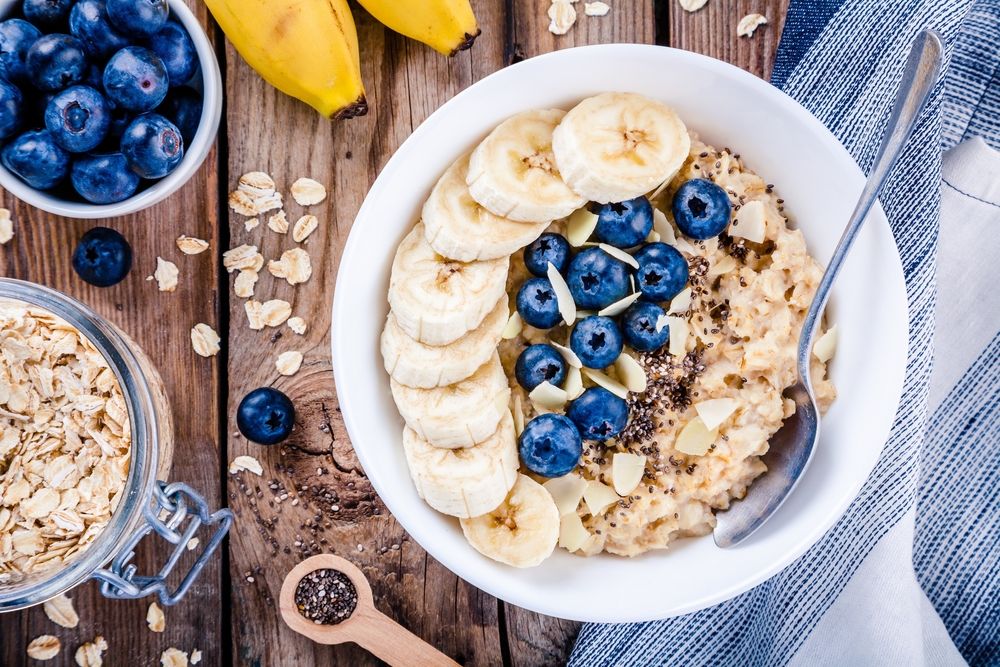Lately, it seems like oatmeal is getting a lot of positive attention. It's hailed for its body-nourishing properties, purported to extend lifespan, and, of course, it's touted as downright delicious. But does oatmeal truly live up to its healthy reputation? Are all the outcomes of consuming oatmeal beneficial? And are there any downsides we should consider?
To uncover the truth, we consulted with nutrition experts and delved into the research to unveil the advantages of incorporating oatmeal into your daily diet. While the majority of oatmeal's effects on health are favorable, there are a couple of potential drawbacks worth noting when savoring a comforting bowl of this hearty cereal.
Here's the scoop from our experts regarding the potential effects of consuming oatmeal.
12 benefits of eating oatmeal.
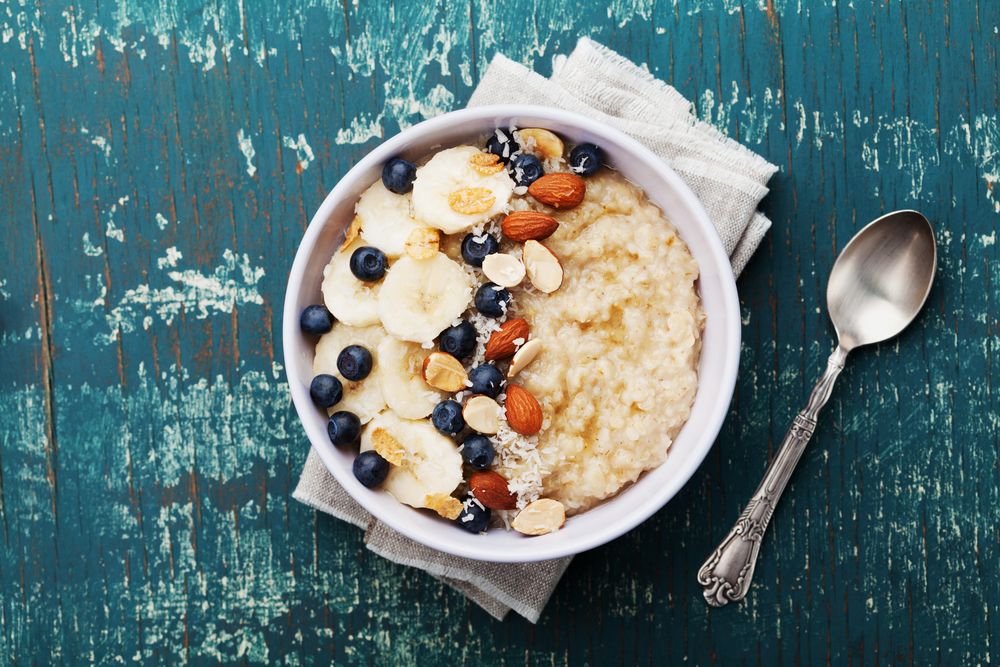
1) It's a good source of fiber.
Just 7% of Americans are meeting their daily fiber requirements, a crucial nutrient essential for various aspects of well-being, such as cholesterol management, digestive health, weight management, and blood sugar control. Incorporating oatmeal into your daily diet can help you reach the recommended daily fiber intake of 28 grams as set by the USDA, which is considered the minimum requirement.
A single cup of prepared rolled oats with water provides 4 grams of fiber, constituting 14% of your daily value (DV) for this often overlooked nutrient. Enhancements like chia seeds, flaxseed, nuts, and berries can further boost the fiber content.
2) Eating oatmeal every day can help you feel full.
Much of the discussion around the health benefits of oatmeal centers on its impressive fiber content.
"Oatmeal is a whole grain packed with fiber, particularly soluble fiber," explains Emily Danckers, MS, RD. "When you consume soluble fiber, it slows down digestion, leading to increased feelings of fullness."
The primary form of soluble fiber in oats is beta-glucan, which a review featured in the journal Nutrition Reviews highlighted for its positive impact on satiety. For instance, one study demonstrated that both old-fashioned and instant oatmeal significantly improved appetite control over a four-hour period compared to consuming ready-to-eat breakfast cereal.
Adding other satiating elements like "protein and/or fat, such as nuts, often prolongs feelings of fullness," notes Rachel Paul, PhD, RD, CDN. "This allows individuals to focus on tasks and activities before considering their next meal. Relying on a satisfying breakfast option like oatmeal fosters consistency in one's daily routine."
3) Oatmeal can help you lose weight.
Offering a rich source of digestion-slowing fiber, "[eating oatmeal can] help individuals feel satiated, potentially curbing excessive calorie intake throughout the day," explains Trista Best, MPH, RD, LD, a registered dietitian and consultant at Balance One Supplements.
A thorough review published in the journal Current Nutrition Reports in 2023 highlighted multiple clinical studies demonstrating oats' contribution to preventing obesity and reducing body weight.
4) It can lower 'bad' cholesterol.
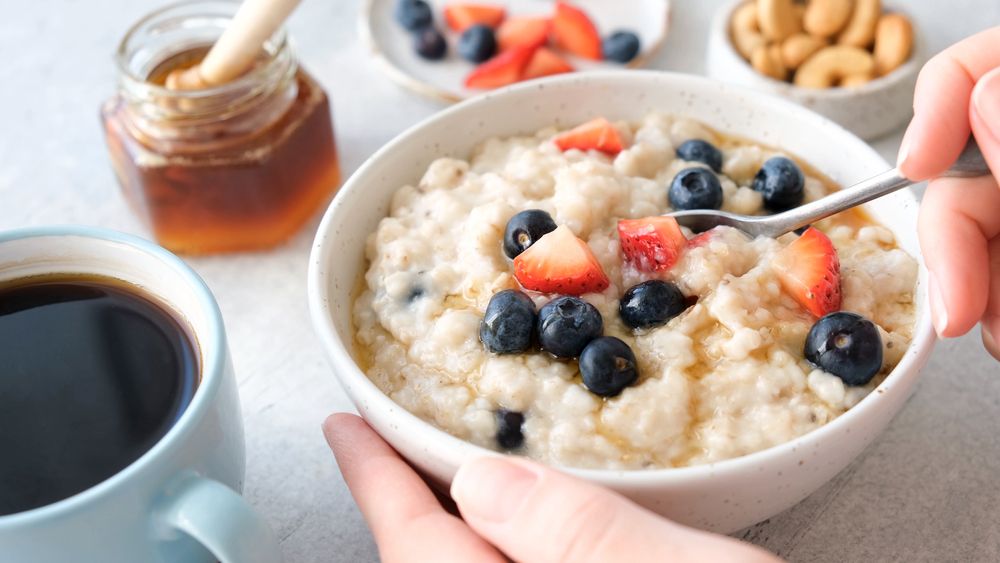
"Eating oatmeal daily can lead to a reduction in total cholesterol levels, a decrease in 'bad' LDL cholesterol, and an increase in 'good' HDL cholesterol," advises Megan Byrd, RD, The Oregon Dietitian.
Once more, this cholesterol-lowering effect of oatmeal seems to be mainly attributed to beta-glucan. However, a review in Food & Function suggests that other nutrients in oats such as phytosterols, phenolic compounds, tocols, and saponins may also play a role, either directly or indirectly, in influencing cholesterol levels.
5) It can help you in the bathroom.
"Oatmeal's fiber content supports gastrointestinal health, promoting regular bowel movements," explains Amy Goodson, MS, RD, CSSD, LD, author of The Sports Nutrition Playbook.
Goodson advises that if you've been consuming limited fiber and have now incorporated daily oatmeal into your diet, it's essential to increase your fluid intake. This is because fiber binds with water and requires adequate hydration to maximize its benefits.
6) It can help you control your blood sugar.
"Consuming oatmeal daily can aid in blood sugar control due to its high fiber content," explains Byrd. "Fiber slows down the rate at which carbohydrates from your diet are absorbed into your bloodstream, resulting in more stable blood sugar levels throughout the day. Oatmeal is indeed a superfood and one that can be incorporated into your daily diet without hesitation!"
7) It supports gut health.
According to a review in the journal Foods, oats boast a wealth of distinctive phytochemicals such as beta-glucan, resistant starch, and phenols, which influence the gut microbiome.
Your gut microbiome comprises a diverse array of bacteria, fungi, and other microorganisms inhabiting your gastrointestinal tract, playing a crucial role in digestive, immune, and even cognitive health. Maintaining a healthy gut is pivotal in warding off numerous diseases, including obesity, diabetes, and colorectal cancer.
Numerous human studies have indicated that oat consumption can elevate levels of beneficial bacteria, such as lactobacilli and bifidobacteria, in the gut, contrasting with a decrease in these levels observed with equivalent amounts of rice intake.
8) Eating oatmeal every day is great for your heart health.
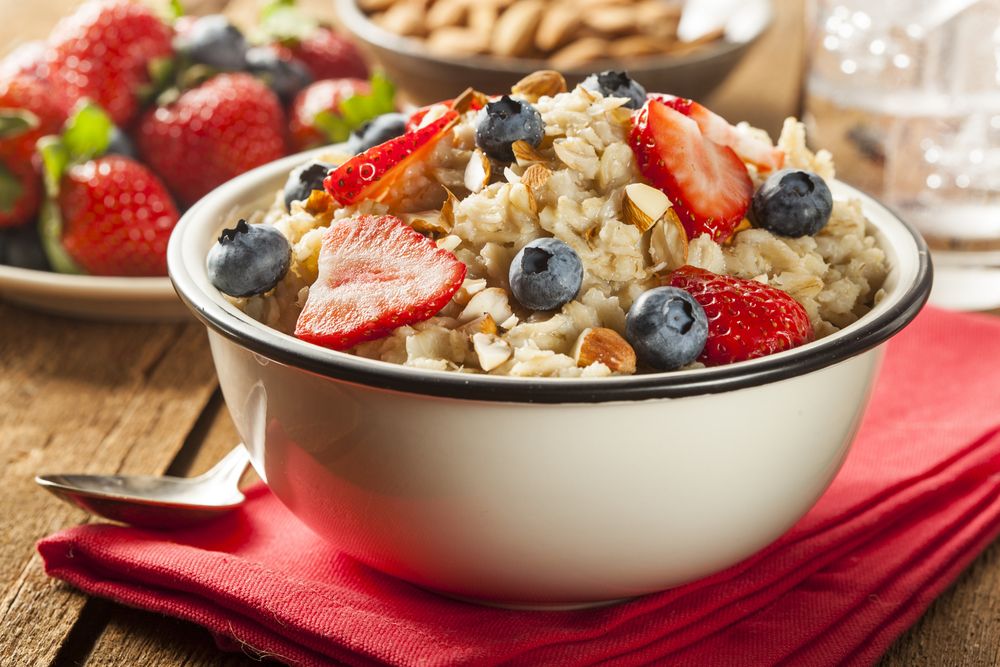
"Oats have long been under the heart-health spotlight," notes Mackenzie Burgess, RDN, a registered dietitian nutritionist and recipe developer at Cheerful Choices. "Continued research underscores their cholesterol-lowering benefits when incorporated regularly into our diets. Particularly, the soluble fiber found in oatmeal may aid in reducing LDL cholesterol."
To diversify your oatmeal regimen, consider soaking them overnight with various flavor enhancements or crafting them into convenient energy bites.
9) It's a source of protein.
In a single cup of prepared old-fashioned oats, you'll find 5 grams of protein. "Protein, combined with fiber, has the potential to prolong feelings of fullness," explains Brenda Braslow, MS, RD for MyNetDiary.
A study published in the American Journal of Clinical Nutrition discovered that overweight individuals managed to shed weight by elevating their protein intake to 30% of their daily calorie intake. While oatmeal may not provide sufficient protein for sustained satiety throughout the day, it serves as an excellent protein-rich option to kickstart your morning.
10) It's an excellent source of many essential nutrients.
Oatmeal stands out as a nutrient-rich food, brimming with essential vitamins and minerals such as manganese, phosphorus, magnesium, and iron.
A single cup of raw oats packs a significant nutrient punch, providing 19% of the Daily Value (DV) for iron, 27% DV for magnesium, 27% DV for phosphorus, and a whopping 128% DV for manganese.
Moreover, the nutritional benefits extend further with the addition of toppings. "Incorporating antioxidant-rich ingredients into your diet becomes effortless with regular oatmeal consumption. Dried fruits, nuts and seeds, and nut butters are teeming with micronutrients that support various health and wellness objectives," notes Best.
11) Oatmeal may lower inflammation.
Persistent inflammation can trigger a plethora of health concerns, spanning from metabolic imbalances to elevated triglyceride levels to unwanted weight gain. Incorporating oatmeal into your daily diet might offer protection against these health challenges. Several studies have highlighted oats' anti-inflammatory effects, attributed partly to the cereal's beta-glucan content.
12) You may live longer.
Indeed, oatmeal stands out as a longevity-promoting food. A study published in the Nutrition Journal suggests that oats may contribute to reducing the risk of autoimmune diseases, heart disease, and weight gain. Additionally, maintaining a consistent intake of whole grains, including oatmeal, has been linked to lower mortality rates, as affirmed by the American Heart Association.
Is oatmeal bad for you?
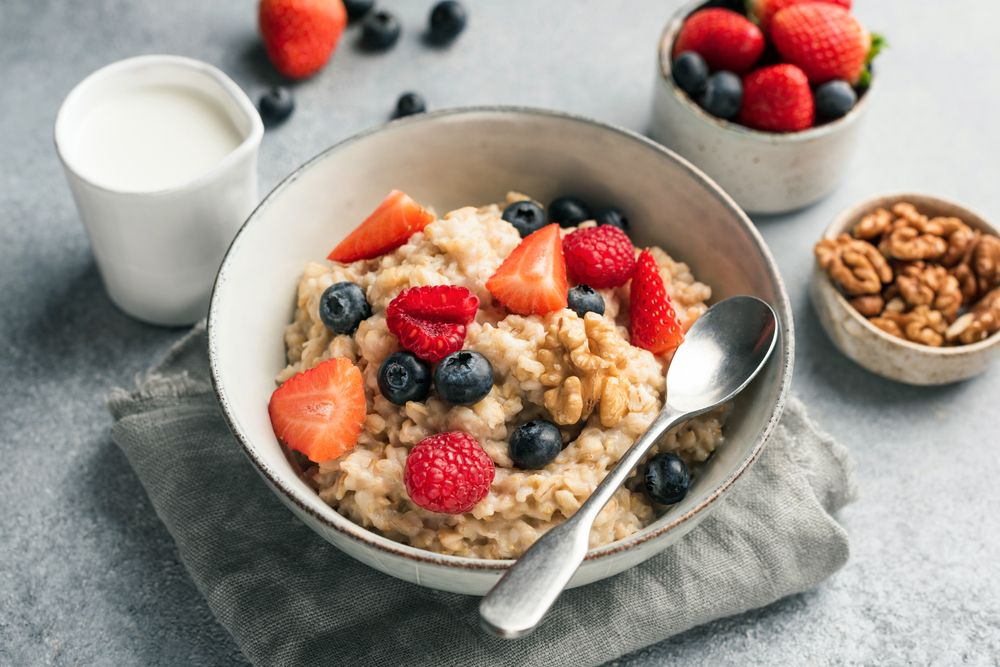
Oatmeal offers numerous health advantages, including improved digestion, potential weight management benefits, enhanced heart health, and increased satiety. With such positive effects, it's clear that oatmeal is a healthy choice. Nonetheless, it's crucial to also acknowledge some potential unwanted side effects oatmeal may bring.
1) You may be exposed to a 'highly toxic agricultural chemical.'
A study published in the Journal of Exposure Science & Environmental Epidemiology in February 2024 sheds light on a concerning revelation: your oats might be exposing you to a hazardous agricultural chemical.
Conducted by the Environmental Working Group (EWG), the peer-reviewed study discovered detectable levels of chlormequat, a pesticide commonly used on oats, in 80% of Americans tested from 2017 to 2023. Additionally, the research revealed detectable levels of chlormequat in 92% of oat-based foods purchased in May 2023, including popular brands like Quaker Oats. Animal studies have linked chlormequat to reproductive and developmental toxicity, prompting concerns about its safety and the potential for similar adverse effects in humans.
Although individual exposure levels in the study remained below safety thresholds established by regulatory agencies, the EWG cautions that cumulative exposure to multiple chemicals could pose health risks, particularly during pregnancy.
This study underscores the importance of ongoing monitoring of chlormequat levels in both food and individuals, as well as the necessity for further research to elucidate its health implications at current exposure levels.
2) Oatmeal may cause some belly bloat
"If you're new to oats, they may cause bloating, so it's advisable to begin with a small portion," advises Lisa Young, PhD, RDN, author of Finally Full, Finally Slim.
Shannon Henry, RD, at EZCare Clinic, explains, "Whole grains like wheat and oats are rich in fiber, glucose, and starch, all of which are metabolized by bacteria in the gut or large intestine, leading to gas and bloating in some individuals. To minimize these side effects, start with a small quantity and gradually increase to your desired amount. As your body becomes accustomed to oat bran, any adverse effects are likely to diminish."
3) It may cause weight gain
While oatmeal can indeed support weight loss, indulging in oversized portions may have the opposite effect. "Consuming a large serving of oatmeal can contribute to weight gain," warns Young. "And be mindful of toppings—while a tablespoon or two of crushed walnuts or flaxseeds can enhance nutritional value, excessive butter or sugar can counteract the benefits."
Moreover, the toppings you choose could also be a culprit for potential weight gain. Sweet additions like sugar, chocolate chips, and other sugary foods not only diminish oatmeal's nutritional profile but also introduce extra calories, unhealthy fats, and sugar into your diet.

